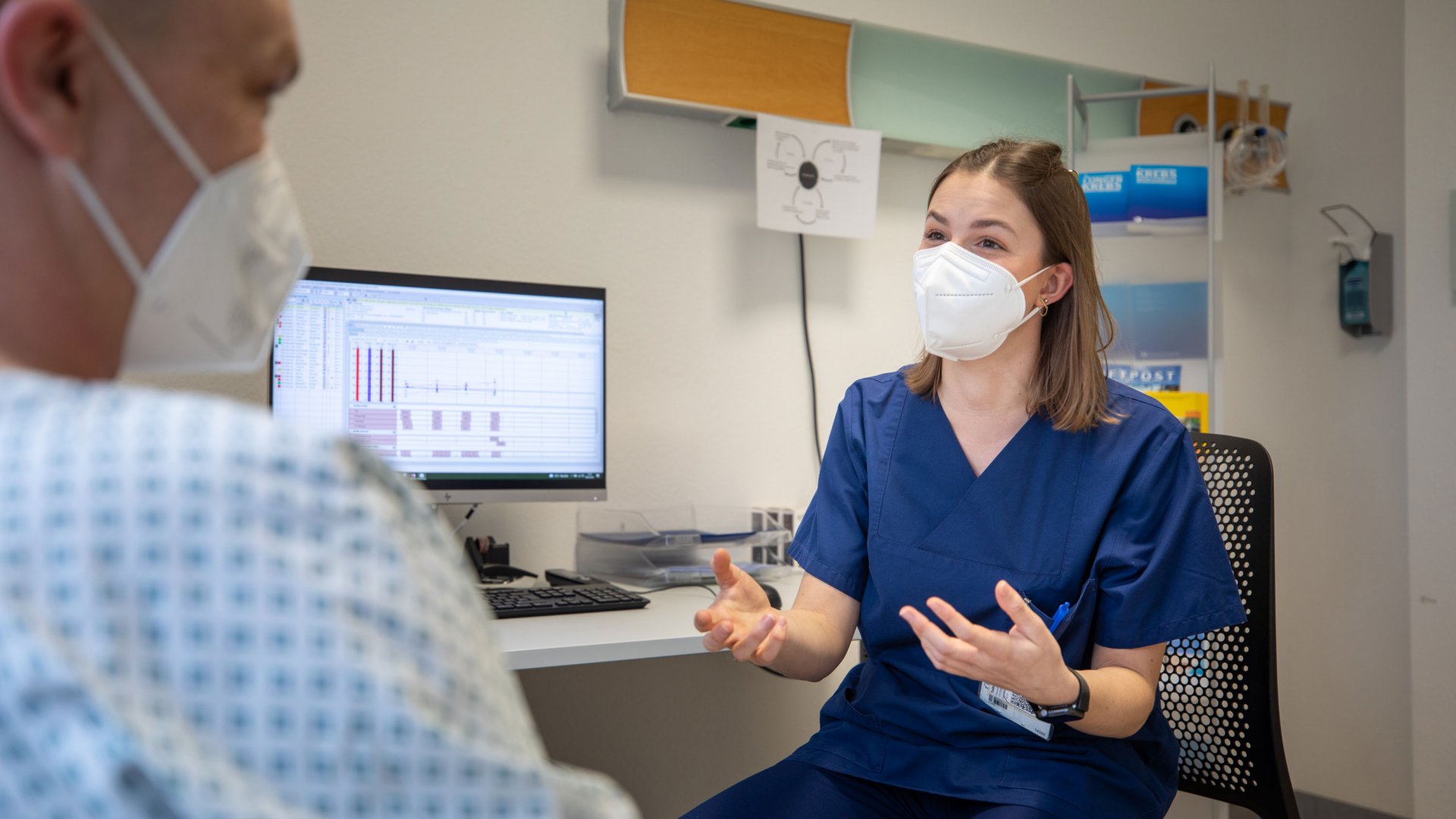Joining Forces for Patients
Since the pandemic, Germany has seen increasing debate around working conditions in the care sector. The Robert Bosch Stiftung’s “360° Nursing” project demonstrates how nursing staff with a mix of skills working together can improve patient care. A visit to the RBK dyspnea clinic in Stuttgart.
Nightmarish, debilitating, frightening: It might be easy to describe in words how it feels when you’re struggling to breathe, but you can’t truly know what it’s like unless you’ve experienced it yourself. For people with chronic lung conditions, discomfort, fear, and even panic are all part of everyday life. And it’s not always possible to immediately seek medical help or ease the situation with medication. “There are various body positions, like the tripod position, that can acutely relieve shortness of breath,” explains Hannah Buß. This involves sitting on a chair and leaning forward with elbows resting on knees; the resulting expansion of the thoracic cavity provides more room to breathe and the discomfort is relieved.
24-year-old Buß has been in charge of the dyspnea [breathlessness] outpatient clinic at the Robert Bosch Hospital in Stuttgart since October 2020 and as team leader is responsible for nursing process control. Part of her role involves advice sessions for patients who suffer from breathlessness, often as a result of lung cancer. She devised the concept herself as part of her bachelor’s degree. In this way, the specialist clinic in Stuttgart combines the latest findings in nursing science with expert, patient-focused care. As part of the “360° Nursing” project, the Robert Bosch Stiftung created 19 such roles for academically qualified nurses at the Stuttgart hospital (see info box).
Funded by the Robert Bosch Stiftung, the project “360° Nursing – Skills Mix for the Patient – in Everyday Care” ran from 2019 to 2021 and examined how a diverse mix of skills within nursing teams leads to more needs-based care – and with it, tangible added value for the patients. Seven lighthouse projects were set up and supported throughout Germany as part of the program. More information here.
Targeted use of skills
The dyspnea clinic in Stuttgart is only the second facility of its kind in Germany. “Our objective was to pool a variety of skills within interprofessional care teams,” explains nursing scientist Eva-Verena Lindenau of the Robert Bosch Hospital. After all, patient care needs in the 21st century are becoming ever more complex: As many arrive at the hospital with multiple morbidities, long-term stabilization of their condition can only be ensured if they are also given tailored advice to prepare and empower them to cope beyond their hospital stay. “A lung cancer patient who also has kidney disease or diabetes doesn’t just need information about the individual conditions and their symptoms; they also need practical pointers, for example on nutrition,” says Lindenau. “This has often been lacking in the health care service up to now.”
This experience was echoed by Hannah Buß before she took over as head of the dyspnea clinic: “A lot of patients are brought to the emergency room in respiratory distress, where they are prescribed oxygen and then discharged shortly after,” she explains. They are only rarely given advice on how to better handle acute breathing difficulties at home themselves. Often in the high-pressure environment of a busy hospital there is simply no time or not enough resources, whereas exercises like the tripod position could prevent another admission and empower patients to feel more in control.
The benefits of variety
The “360° Nursing” project concluded that excellent and sustainable patient care is only possible if a care team combines a mix of expertise, from staff with one year’s training all the way through to academically qualified nurses. But one thing is clear: All nursing staff play a vital role toward the care and welfare of patients. After all, the COVID pandemic has reignited the debate on recognition in health care. It’s a start.
Already widespread in the U.S., the profession of Advanced Practice Registered Nurse is acquired through several years’ experience in direct patient care plus a master’s degree. In Germany too, the Science and Humanities Council recommends an academization rate of around 20 percent for the care profession over the long term. And with good reason. “Nursing staff with an academic background view patient care processes from a scientific perspective and ensure that all care measures reflect the current state of research,” explains Eva-Verena Lindenau. The “360° Nursing” project, too, saw the academization rate in direct nursing care at the Robert Bosch Hospital rise to six percent. And that’s just the first step
Helping people to help themselves
In the course of her work, Hannah Buß has often witnessed patients in particular benefiting enormously from the changes in care. Above all, they appreciate having someone take time for their individual needs. Only last week, Buß recounts, a man in his mid-60s was transferred from the ER to her clinic following his first ever dyspnea attack. “He was terrified,” she remembers. “I spoke with him for a good two hours about his condition and what he could do himself to alleviate the discomfort.” Afterwards, Buß also spoke with his wife, because relatives have an important part to play in successful self-management by patients. In the emergency room or in a normal ward, such in-depth advice sessions are rarely possible. Before he was discharged from hospital, the patient asked to see Hannah Buß once more so he could thank her. “For him it was important to realize that he can cope with the problem himself,” says Buß. “He then said he wants to be stronger than his breathing problems. And of course that’s lovely feedback for me.” hat dann gesagt, dass er stärker sein will als seine Atemnot. Das ist für mich natürlich ein schönes Feedback.“

